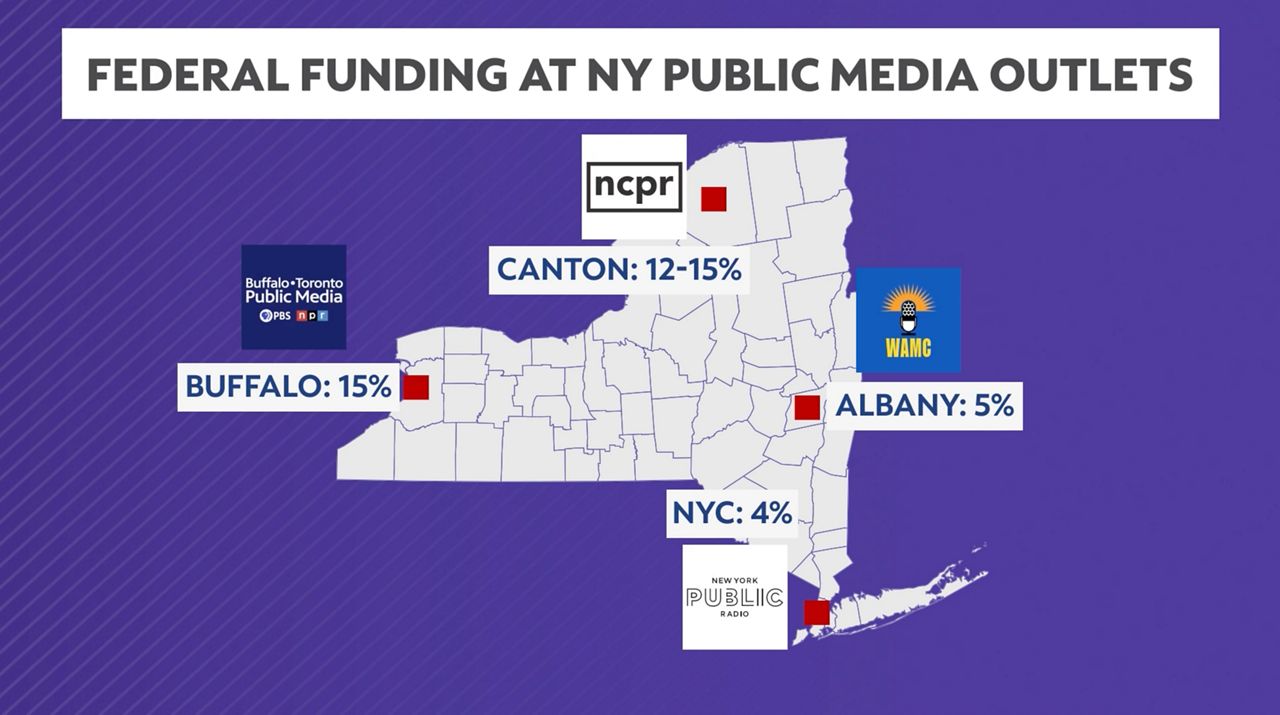Across New York, local public radio and television stations are warning of potential cuts if their federal funding is taken away as part of a bill pushed by President Donald Trump.
The U.S. Senate is poised to vote next week on whether to claw back more than $1 billion in funding for the Corporation for Public Broadcasting, which supports more than 1,500 public television and radio stations nationwide, including NPR and PBS affiliates across New York.
One of those stations is North Country Public Radio, where a staff of 17 provides news and entertainment to all corners of rural, northern part of the state, from the St. Lawrence Seaway to the Adirondacks.
Between 12-15% of NCRP’s annual income comes from federal grants, according to station manager Mitch Teich.
“If we were to lose what basically amounts to between $315,000 and $350,000 — first, we’d try to make it up from somewhere,” Teich said. “And second, we'd look at things that we would potentially cut.”
North Country Public Radio, of course, is not alone. PBS and NPR stations across the state and nation will face tough choices if their federal funding is revoked. Trump is vowing to withhold his endorsement from Republican members of Congress who do not approve the cuts.
Tom Calderone, CEO of Buffalo-Toronto Public Media, which encompasses both radio and television stations, told Spectrum News that about 15% of his organization’s operating budget comes from federal grants.
He said they have been preparing for the possibility of funding cuts since January.
“There's just too many programming initiatives, both on TV and radio, that we do that if it went away, nobody in the region would see it,” Calderone said.
“We're going to have to lean on just other ways of getting revenue into the building so that we can maintain the jobs and, frankly, maintain what people expect from public media,” he added.
At WAMC, which reaches listeners from the Hudson Valley, through Albany, and into Vermont and Massachusetts, federal funding comprises about 5% of the annual budget, according to Sarah Gilbert, the station’s president and CEO.
“That may not sound like a lot, but WAMC … relies on community and federal support to deliver news and culture that is accessible to all — no paywalls, no subscriptions. Just fact-based news about events that have a direct impact on the lives of our listeners and readers,” she said in a statement. “We also provide essential emergency early warning alerts that keep New Yorkers safe.”

New York Public Radio — parent of WNYC in New York City — is less reliant on Washington than many smaller stations.
But WNYC also produces nationally syndicated shows such as On the Media and Radiolab. If smaller stations lose federal funding, they might be less able to pay the carriage fees to air those programs.
“We could be looking at a situation where stations’ budgets are cut, and they may no longer be able to afford programming from us or from NPR or American Public Media,” LaFontaine Oliver, president and CEO of New York Public Radio, said.
Oliver likened public radio across the state and country to a “delicate and intricate ecosystem.”
Last month, on a near party-line vote, the House approved clawing back the money for the Corporation for Public Broadcasting. Democrats opposed the so-called rescissions package, while nearly all Republicans voted in support.
“We’re on the floor of the House of Representatives … debating legislation that targets Elmo and Big Bird,” House Democratic Leader Hakeem Jeffries of Brooklyn said during the debate, bashing the bill.
“This bill is real simple: Don't spend money on stupid things and don't subsidize biased media,” Rep. Jim Jordan, Republican of Ohio, said in support.
Staten Island Republican Rep. Nicole Malliotakis was one of four House Republicans who voted against the measure.
If the Senate does not rescind the money by the Friday, July 18 deadline, public media’s current funding is safe — at least for now.
Some Senate Republicans have voiced skepticism about the cuts, especially those from rural states where these stations are sometimes the sole source for emergency warnings.
I caught up with @BillNye just now to ask why it's important to save public media from funding cuts proposed by the White House.
— Melody Kloepfer (@MelodyKloepfer) July 9, 2025
He says @PBS is for everybody, and is an extension of U.S. soft power...and of course that's where his Science Guy show aired.
WATCH @SpectrumNewsDC pic.twitter.com/FbM8okgEee
Earlier this week, Spectrum News caught up with Bill Nye, perhaps best known for his show “Bill Nye the Science Guy,” which aired on PBS in the 1990s.
Making the pitch for public media, he said, “Sesame Street, Masterpiece Theater — these are things that enrich your life. And in many places, people count on PBS for a lot of local news and weather.”
The cuts to public media are one part of a larger, $9.4 billion cut proposal from the Trump White House. The plan would also claw back billions in foreign aid.
Spectrum News Washington Bureau producer Melody Kloepfer contributed to this report.


